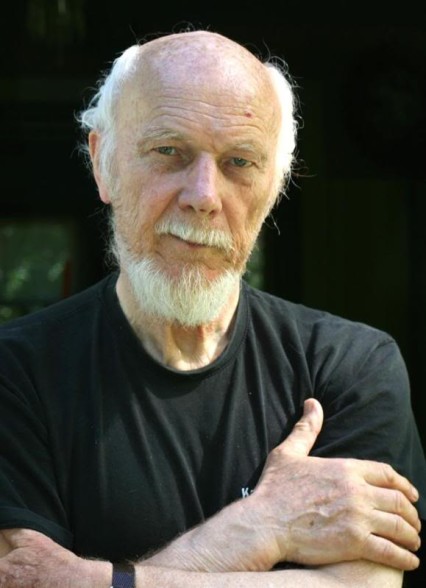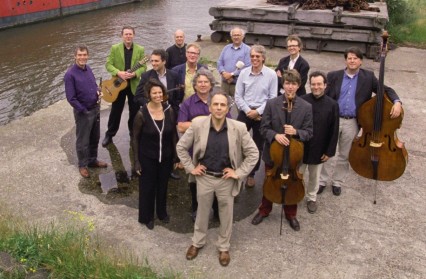The first of a series of Wales Arts Review reports from the Vale of Glamorgan Festival 2015. Steph Power introduces the Festival, and discusses the preview and inaugural concerts:
BBC National Orchestra of Wales (conductor Clark Rundell / oboe David Cowley)
BBC Hoddinott Hall, Cardiff, March 18 2015
Nieuw Ensemble (conductor Ed Spanjaard)
All Saints Church, Penarth, May 13 2015
The Vale of Glamorgan Festival is admired internationally for its strong, pioneering programming under the artistic directorship of composer, John Metcalf. It is the only festival in the UK dedicated to the work of living composers, and, this year, an especially rich and eclectic mix of music is on offer across its 12-day span (May 12-23). Metcalf’s vision is not so much a ‘new music festival’ as a ‘music festival’; a simple but profound distinction which signals the key to his success. Not only does the Festival attract highly respected composers and performers from around the world, but they are greeted with enthusiasm by an audience from a far wider demographic than that often associated with new music, giving the lie to outdated notions that art music of today is somehow ‘inaccessible’.
2015 sees the 80th birthday of one of the world’s most celebrated composers: the Estonian, Arvo Pärt. The Vale Festival has long been a champion of Pärt’s sublimely searching, intensely distilled music, and Metcalf is taking the opportunity to feature several of his works alongside the Grammy-nominated 35-year-old composer, Dobrinka Tabakova. Hailing originally from Bulgaria, Tabakova and her family moved to Britain in 1991 – coincidentally, the same year Estonia won independence at the break-up of the then Soviet Union, following the collapse of communist rule across Eastern Europe. Her music too, in a very different way from Pärt’s, seems to well up from a deep, inner source at once ancient and modern. Audiences will be able to meet her this coming week, as she will be present at the Vale to hear performances and premieres of her works from the small to the large-scale, alongside music by some 34 composers of ten different nationalities from the UK to China.
Pärt and Tabakova had impressive performances in a preview concert given by the BBC National Orchestra of Wales back in March at BBC Hoddinott Hall (on the 18th, superbly conducted by Clark Rundell). Pärt’s beloved Cantus in Memory of Benjamin Britten (1977) was paired with Tabakova’s beautifully resonant Fantasy Homage to Schubert (2013) for string orchestra. Bookending the two were pieces of a totally different sylistic kettle of fish, representing another, distinctly more anarchic, strand running through this year’s Vale Festival.
British composer Richard Ayres – whose opera Peter Pan will be given its UK premiere tomorrow evening by Welsh National Opera at the Wales Millennium Centre* – inhabits a world of high energy and wild imagination. His excerpt from No. 37b: I. Alfred Wallis (in paradise), and No. 40 (NONcerto for Oboe), were dispatched with virtuoso glee, with plaudits especially due to oboe soloist David Cowley. It is a pity – and perhaps a sign of the cultural times – that BBC NOW have evidently opted for Dr Who rather than taking part in the Festival itself this year as they traditionally do. However, any lingering disappointment will be swept aside by the visit next week of the Estonian Philharmonic Chamber Choir and Tallinn Chamber Orchestra in a coup for the Festival; both are world-leading ensembles.
Vale audiences have had further opportunities to hear Ayres’s music in the Festival’s first week (watch out for reports to come in Wales Arts Review). But to begin at the (official) beginning, as it were, it was a pan-national programme of Dutch, Estonian and Chinese music which announced the start of the Festival proper on May 13 at All Saints Church in Penarth.

The formation of the Netherland’s Nieuw Ensemble was sparked by incidental music composed in 1981 for a staging of Shakespeare’s poem Venus and Adonis. Composer Theo Loevendie had used an ensemble featuring a beguiling trio of plucked instruments: harp, guitar and mandolin. The musicians formed a permanent group around the combination, including the more usual string quartet, single woodwind, piano and percussion as need arises. This was the ensemble’s first ever visit to Wales, and they performed with sparkling, easy brilliance under conductor Ed Spanjaard.
Appropriately enough, the evening commenced with the Suite from Venus and Adonis. It proved a wonderfully inventive piece; every bit as colourful as the Nieuw’s history suggests. Indeed, a beautiful evening light, suffusing the church through stained glass windows, only enhanced the myriad instrumental colours on display. Artistic director Joël Bons spoke after the concert about Stravinsky’s particular importance for successive generations of Dutch composers. But it was Schoenberg’s Serenade Op. 24 that I was most reminded of in this terrific piece, with its finely-wrought, plucked sounds and tail-chasing, subtly rhythmic figurations.
Physicality performed with intelligence and grace seemed the order of the evening, which continued with a short Dance, again by Loevendie, and thence to three pieces by different Estonian composers. First came Helena Tulve’s wonderfully densely textured Ligne d’horizon (2005), which invited us to picture the line of the horizon as always receding yet ever around us; ‘sometimes wavy and ragged, sometimes a perfect circle’. Pärt’s simple miniature Scala cromatica (2007) for piano trio proved a lovely foil, leading to Toivo Tulev’s Don’t Call Him too Early. Written in 2002, this enigmatic piece was full of sensual swells with broad, soulful tunes, as it were attempting to break out within a piece full of charged and effective writing.
After the interval, the ensemble presented a further trio of composers, this time from China. The Nieuw Ensemble has worked extensively with Chinese composers over the years – indeed it was in Beijing that Metcalf and Bons first met – and their sound has been altered irrevocably, and beautifully, as a result. The cross-cultural nuances of those plucked instruments, so redolent of Chinese pipa, and other lute-like instruments, was everywhere in this second half. Tan Dun’s Circle with Four Trios, Conductor and Audience (1992) required the audience at points to sigh, whistle like birds, gossip and shout, encircled by the ensemble who were arranged around the church. The audience happily obliged, to produce a piece – now spooky, now touching – which added up to far more than the sum of its parts.
Young composer Erqing Wang’s Paradise Drowned (2014) was a paean to islands under threat from rising sea levels. The piece was somewhat over-scored, but was passionately felt, with some well-devised touches: dovetailing percussion with woodwind, for instance. Tam-tams scraped with metal sticks was one sound which also stood out in Qigang Chen’s Poeme Lyrique II (1991). As with all three of these pieces, colour was more important than structure or development of the material – and here, we had the extraordinary addition of a solo singer, Romain Bischoff. With an astonishing vocal display, Bischoff sang in traditional Beijing opera fashion of human solitude; glissandi and wailing falsetto, exquisite deep resonance and guttural declamation were combined with instrumental writing that seemed most lovely, to my ears, in its moments of sumptuous, French-inspired harmony and languid character.
The previous day, May 12, the Nieuw Ensemble had conducted workshops with students at the Royal Welsh College of Music and Drama, with whom they declared themselves most impressed. In a generous encore, they performed one of the pieces they had discovered during the day; a lovely gesture at the start of a Festival which treats international superstar and student composer alike with equal, down-to-earth respect.
Details of the Vale of Glamorgan Festival and tickets can be found at http://valeofglamorganfestival.org.uk/home/
* See https://www.wno.org.uk/event/peter-pan for details and tickets.
Photo of the Nieuw Ensemble by Kadir van Lohuizen.











